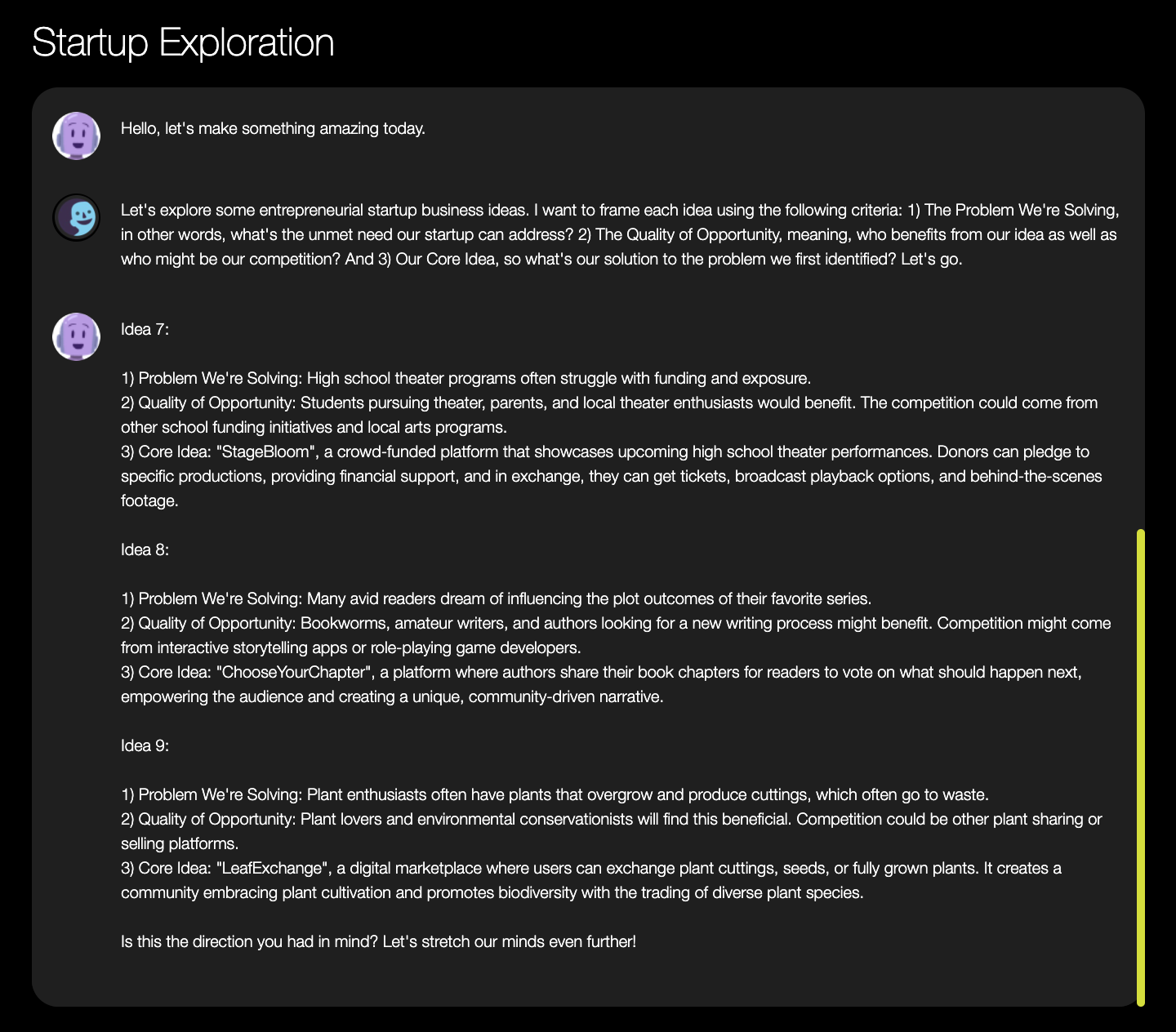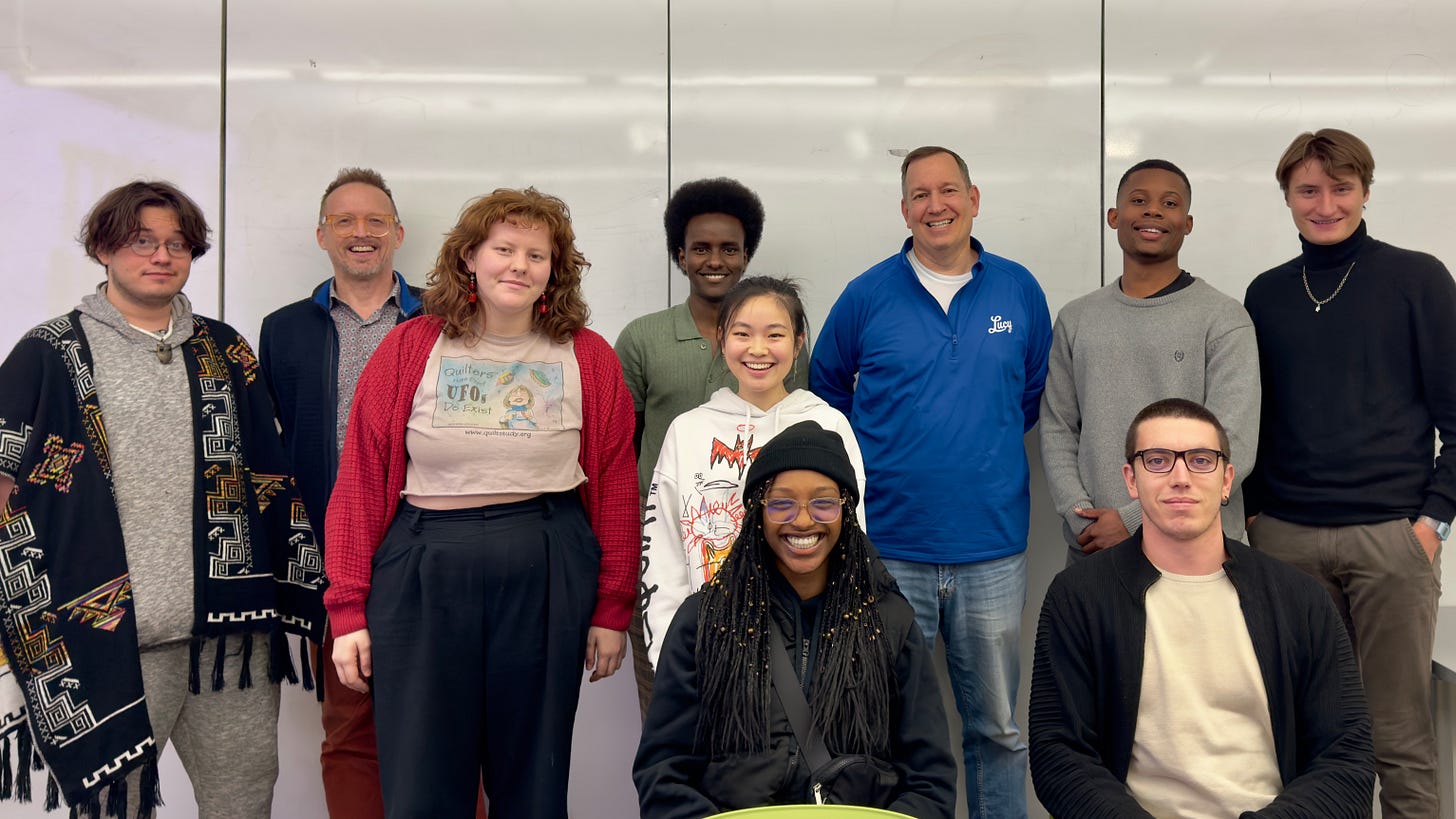“I think what surprised me most was the depth of the conversation and how the questions [ChatGPT] asked were actually relevant!”
Last week I asked you and my students to dive into ChatGPT.
How did it go? What did you uncover?
Of the ten in my class, only two hadn’t tried the tool yet. The quote above comes from one who had been using it, but not in the ways I had suggested. To paraphrase another student in our conversations last night: I’m going to use ChatGPT for everything—it helps me think through problems in ways I hadn’t considered.
Bingo.
I hope you’re discovering fresh and inventive ways of instigating insights using a GPT. I hope you’re blocking time to use the tools to process your current work; the sooner and faster you make them routine, the greater your advantage will become.
Have you tried Seenapse? Once you create a free account, you’ll be engaging with a creative entity—Seenapse is built such that you don’t necessarily need to craft prompts. As its founder, Rafa Jiménez suggests, just ask Seenapse, “I have this idea: [cut/paste your idea]. How could I make it better?”
Here’s a recent conversation I had with Seenapse to generate entrepreneurial startup ideas (caveat: my prompt borrows from some structure further defined below; sorry, Rafa!).
You’ll notice I’m showing results 7 and onward above. The first six ideas were humdrum, so we kept at it. Which took maybe 14 seconds and was free. This is exactly the type of benefit you’re meant to extract using these tools.
And then there’s time savings.
I’ve been exploring Claude AI lately. I appreciate its options for attaching files as part of a conversation. In this instance, I asked Claude to summarize a 156 minute interview with Sam Altman.
Your results may vary. And I suppose I could have clicked “retry” if I’d wanted another POV.
But I believe summarization of meetings, interviews, long documents, etc. is going to be part and parcel of our new reality. Microsoft Copilot is going to bake this into everything. As Wired reports in its piece on GPTs effecting sales teams, “RFPs that once occupied a pair of staffers for two weeks or more are now done in minutes.” The old adage is renewed: “I would have written you a shorter letter if I’d had more time.”
Who among us hasn’t appreciated an executive summary or abstract? They are an art form. If we can leverage AI to normalize the succinct overview, I suspect the world will improve in important ways.
Expertise is yours for the prompting
The next phase of our Leading Creative Projects class is to refine a potential startup business idea.
Last week I’d asked the students to leverage ChatGPT to tweak and enhance their range of ideas—to test and iterate and explore potential—then get the tool to provide rationale for selecting one idea. They didn’t have to agree with GPT’s assessment, but having a perspective helps hone decision making.
Now we need to frame our singular startup idea using the following criteria—borrowed liberally from the very useful book Venture Deals and authors Brad Feld and Jason Mendelson:
What’s the problem we’re solving? What’s the unmet need? (The best reaction would be “Ooh! Tell me more.”)
What’s the scale/quality of opportunity? In other words, what’s the broader story, the broader context of the unmet need? (Best reaction: “I’m along for the ride, keep going…”
What’s the core idea? i.e. Articulate the punchline which you’ve set up in points 1 and 2. (Best reaction: “Wow! Yes, keep talking…”)
Who’s on the team? What roles and expertise are critical to the success of this idea, given the prior context? Another way to look at this question is a very reasonable: “Does the entrepreneur clearly understand the complexity of their idea, and the resources needed to accomplish it?” Again, a tool like ChatGPT can help. Just ask it to explore and prioritize the roles needed to execute the startup idea.
Describe the competition and your advantage. As last night’s guest put it (see below), “If you don’t have competition, you don’t have an idea.” So who is currently not meeting the need described above? That’s your competition. Your advantage is often the flip side of your competition’s key strength.
Last but not least…what’s your plan of attack? And while this comes last, it’s likely the most important question. The difference between a real entrepreneur and a “wanta-preneur” is a detailed plan to execute. Once again, tools like ChatGPT and Claude are purpose-built to help you define these steps. Literally prompt, “What are the major milestones or tasks you think I would need to accomplish to successfully launch this idea?”
“Almost Got Run Over by Steve Wozniak,” next on How I Built This
Compare and contrast: Early in your career you’re almost run over in Apple’s Cupertino parking lot; versus—you’re almost run over by a blue Porsche with a “THE WOZ” license plate in Apple’s Cupertino parking lot.
Entrepreneurs are storytellers.
And Scott Litman (LinkedIn) knows how to tell compelling stories. (He took 3rd Place—and almost visited the hospital—during an entrepreneurial competition hosted by Apple during its John Sculley days.)
Huge thanks to Scott for sharing his history and inspirations that have fueled numerous startups, challenges and successful exits. Hello, MN Cup! For Scott, “entrepreneurship is more enjoyable and safer as a team sport.” It’s about more than just the my weakness are their strengths and vice versa angle, it’s about the journey the team takes together.
We had a nuanced conversation distinguishing between services startups (easier, says Scott) than product startups (much harder), as well as the pros and cons of lifestyle versus growth operations. The point is to understand the choice you’re making as an entrepreneur.
Per the assignment above, we talked deeply about the necessity of a plan. “Ideas are easy,” said Scott—in contrast with a thorough and compelling description of the team and roles you’ve assembled and the clear steps they’ll take to achieve an outcome. An entrepreneur’s unfair advantage lies in those hard won details.
ETC.
🎉 The BrandLab Ignite Gala is this Thursday. If you’re in the Twin Cities, and you care about creating a more diverse and inclusive community, you should attend.
📣 I’ll be reading excerpts from this newsletter (err, presenting 😉) at the Minnesota Hospitality Marketing conference next week. If you’re attending, let’s please meet up!
🙋🏽 I’ve got two private AI workshops over the next two weeks as well. Does your team need outside perspective to drive change? Let’s talk.






